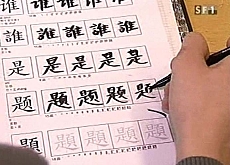Pupils get to grips with Chinese

Growing up in a multilingual country, language learning often comes naturally to Swiss children – many of whom are bilingual.
Most learn at least one of the Swiss national languages, plus English, at school.
But 12 pupils at the Wettingen upper secondary school in north-eastern Switzerland have set themselves an additional challenge by opting to studying Chinese – considered one of the world’s most difficult languages.
For the past two months they have been spending three hours a week practising the characters, words and intonation.
Although their speaking is coming along well, the students find writing Mandarin much harder.
Teenager Gabriel Hüni told Swiss television’s Schweiz Aktuell programme: “It’s a myth that Chinese is difficult.
“Actually it doesn’t feel any more difficult than learning French. But when it comes to Chinese writing, it’s like starting in kindergarten again.”
Economic power
Chinese is spoken by 1.3 billion people. There are various dialects, but the main language is Mandarin, which is spoken by 850 million and is also the language of television, radio and newspapers.
Brigitte Kölla teaches Mandarin at Zürich University. She says that after three years of study, Chinese learners should be able to recognise more than 1,000 characters.
“After the course my pupils should be able to read a Chinese newspaper article or at least understand its content,” Kölla said.
The privately funded project is the brainchild of school rector Urs Strässle, who recognised the growing importance of Chinese as a language of business.
“China is very trendy. It’s the leading economic power of the 21st century,” Strässle told Schweiz Aktuell.
“We want to prepare our students for their future as well as possible.
“That’s why I feel that offering Chinese courses is important – especially when I consider that our school is situated in the region of Baden, a dynamic economic area with many export-led firms.”
A funding first
One of the big firms in the area is the Swiss subsidiary of Zurich-based engineering giant ABB, which has been operating in China for almost ten years.
The Swiss-Swedish technology firm subsidises the optional Chinese course in Wettingen to the tune of about SFr8,000 ($6,617).
It is the first time a firm has paid for a school course of this kind in Switzerland.
Rolf Schaumann, the chairman of the board of ABB Switzerland, said: “The economic future over the next decade will be decided in Asia and especially in China.
“For ABB Switzerland, as well as for many other Swiss firms, China is the biggest export market. That’s why I think it’s important for us in Switzerland to find out about China’s culture and language.”
Alarm
But not everyone is happy with this situation. The Aargau teachers’ association has raised the alarm over private funding of a school course.
“Private firms funding aspects of our public education is not a model we would like to see copied,” said the association’s Niklaus Stöckli.
“Whoever pays, sets the rules. In a democratic society, public education must be publicly financed.”
But Strässle says ABB is not looking for any direct return on its investment.
“I don’t feel that we owe ABB anything and ABB has never set any conditions,” he told Swiss television.
For the students on the Chinese course the question of who pays is secondary. For them, the most important thing is what they personally get out of it.
Student Leonhard Braun says: “It is a big advantage to speak Chinese, and it definitely improves your job prospects. It might even be possible to find a job in China.”
At the moment the students are still struggling with a lot of theory.
But in a couple of months they will have the chance to practise their Chinese for the first time, when the whole class travels to Beijing on a study trip.
swissinfo
The Swiss education system is divided into the following stages: pre-school, primary, secondary and upper secondary, tertiary and adult.
Upper secondary is post-compulsory schooling and generally lasts three to four years.
Pupils start their first foreign language – usually one of the national languages – in primary school.

In compliance with the JTI standards
More: SWI swissinfo.ch certified by the Journalism Trust Initiative











You can find an overview of ongoing debates with our journalists here . Please join us!
If you want to start a conversation about a topic raised in this article or want to report factual errors, email us at english@swissinfo.ch.